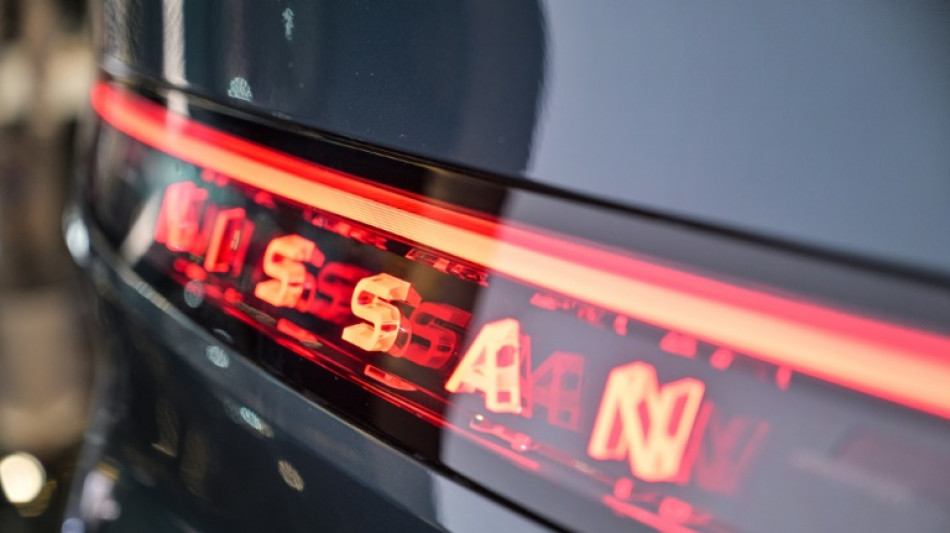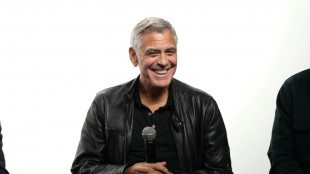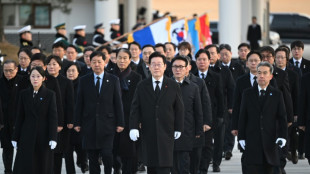
| RBGPF | -0.37% | 80.75 | $ | |
| SCS | 0.12% | 16.14 | $ | |
| JRI | 0.22% | 13.61 | $ | |
| BCC | -0.26% | 73.6 | $ | |
| NGG | -0.54% | 77.35 | $ | |
| CMSD | 0.09% | 23.15 | $ | |
| GSK | -0.53% | 49.04 | $ | |
| RIO | -0.61% | 80.03 | $ | |
| RYCEF | 0.13% | 15.51 | $ | |
| CMSC | -0.15% | 22.65 | $ | |
| RELX | -1.71% | 40.42 | $ | |
| BCE | 1.05% | 23.82 | $ | |
| VOD | -0.15% | 13.21 | $ | |
| AZN | -0.63% | 91.93 | $ | |
| BP | -0.06% | 34.73 | $ | |
| BTI | 0.12% | 56.62 | $ |

Nissan posts $4.5 billion annual net loss, says to cut 20,000 jobs
Japan's Nissan posted a huge annual net loss of $4.5 billion on Tuesday while confirming reports that it plans to cut 15 percent of its global workforce and warning about the possible impact of US tariffs.
The carmaker, whose mooted merger with Honda collapsed earlier this year, is heavily indebted and engaged in an expensive business restructuring plan.
Nissan reported a net loss of 671 billion yen for 2024-25 but did not issue a net profit forecast for the financial year that began in April. It did say, however, that it expects sales of 12.5 trillion yen in 2025-26.
"The uncertain nature of US tariff measures makes it difficult for us to rationally estimate our full-year forecast for operating profit and net profit, and therefore we have left those figures unspecified," CEO Ivan Espinosa told reporters.
"Nissan must prioritise self-improvement with greater urgency and speed."
The company's worst ever full-year net loss was 684 billion yen in 1999-2000, during a financial crisis that birthed its rocky partnership with French automaker Renault.
The company's shares closed three percent higher on Tuesday after reports, later confirmed by Nissan, said it was planning a total of 20,000 job cuts worldwide.
As part of recovery efforts Nissan also said it would "consolidate its vehicle production plants from 17 to 10 by fiscal year 2027".
Like many peers, Nissan is finding it difficult to compete against Chinese electric vehicle brands, while its profits are also under threat from US tariffs.
"In China, we will strengthen our market performance by unleashing multiple new-energy vehicles," it said in a statement.
The possible merger with Japanese rival Honda had been seen as a potential lifeline but talks collapsed in February when the latter proposed making Nissan a subsidiary instead of integrating under a holding firm.
Nissan has faced numerous speed bumps in recent years -- including the 2018 arrest of former boss Carlos Ghosn, who later fled Japan concealed in an audio equipment box.
The automaker, whose shares have tanked nearly 40 percent over the past year, appointed Espinosa CEO in March.
Ratings agencies have downgraded the firm to junk, with Moody's citing its "weak profitability" and "ageing model portfolio".
And this month Nissan shelved plans, only recently agreed, to build a $1 billion battery plant in southern Japan owing to the tough "business environment".
Of all Japan's major automakers, Nissan is likely to be the most severely impacted by US President Donald Trump's 25 percent tariff on imported vehicles, Bloomberg Intelligence analyst Tatsuo Yoshida told AFP ahead of Tuesday's earnings report.
Its clientele has historically been more price-sensitive than that of its rivals, he said.
So the company "can't pass the costs on to consumers to the same extent as Toyota or Honda without suffering a significant loss in sales units", he added.
G.Lombardi--GdR


